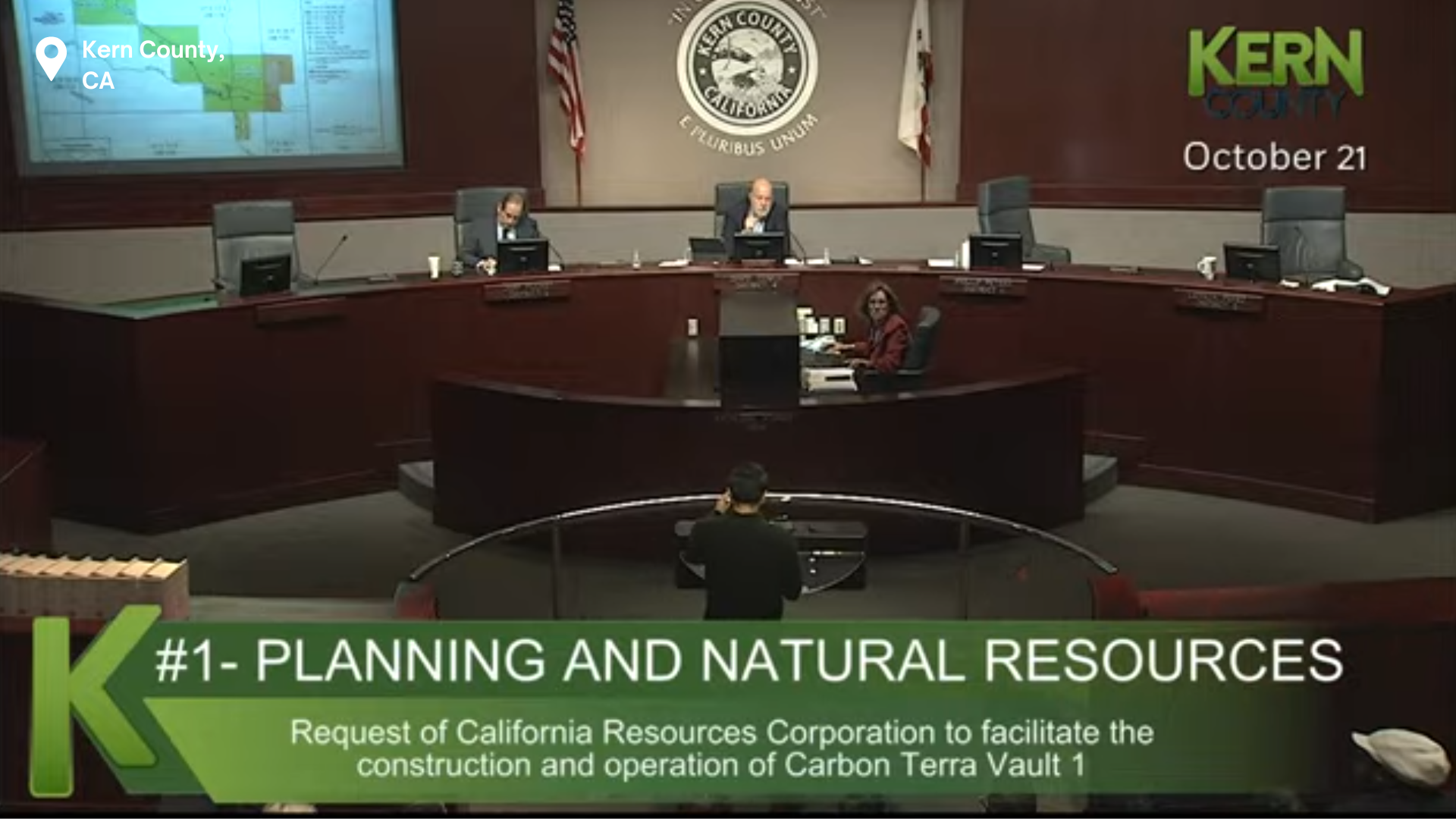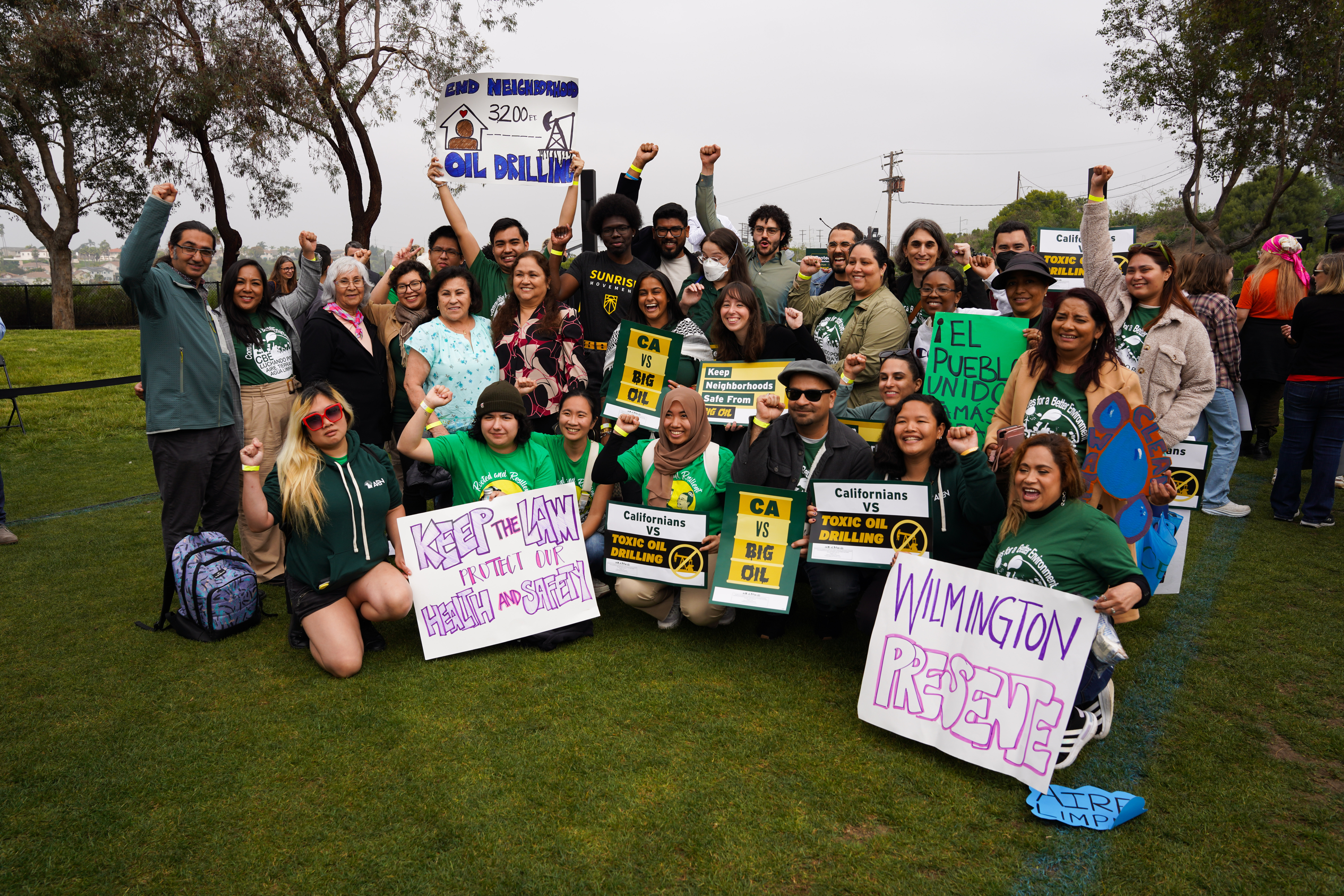BAKERSFIELD, CA — In a decision that climate advocates and local residents say will undermine California’s hard-fought climate progress, the Kern County Board of Supervisors today approved the state’s first carbon capture and storage (CCS) project, Carbon TerraVault I. The controversial decision comes despite fierce opposition from environmental groups, public health experts, and residents living near the proposed site, who warn that the project poses severe risks to both the climate and community safety.
“The people of Kern County have been treated as expendable— for too long, working class and farmworker families and communities of color have been forced to bear the brunt of pollution while corporations rake in profits,” said Dolores Huerta, president of the Dolores Huerta Foundation and co-founder of the United Farm Workers union with César Chávez. “The fight to move California beyond fossil fuels is the next front in our battle for social, environmental, and racial justice. Approving this CCS project isn’t progress; it’s just another way to prop up the fossil fuel industry at the expense of Kern families’ health and future. We support real solutions that protect our people and our climate and move us towards more sustainable energy sources, not empty promises from greedy oil companies looking to line their pockets by putting us in greater danger.
CCS, heralded by the oil industry as a climate solution, has a dismal track record. Past projects have siphoned billions of dollars away from public funds, draining critical resources from real climate solutions. Around the globe, CCS projects have failed to meet their emission reduction targets while also introducing serious community risks such as air pollution, water contamination, seismic activity and pipeline leaks.
“California just fell for the biggest corporate scam since filtered cigarettes,” said Victoria Bogdan Tejeda, an attorney at the Center for Biological Diversity’s Climate Law Institute. “Carbon capture is a dangerous, wildly expensive failure. Instead of propping up fossil fuel interests, California should be investing in the transition to true renewable energy.”
Dangers to Community, Environment & Climate
The community risks associated with CCS are significant. The Carbon TerraVault I project involves transporting carbon dioxide through 11 miles of pipelines, some of which run alarmingly close to a Buttonwillow elementary school. If a leak were to occur, the consequences could be deadly—exposing nearby residents, workers, and children to asphyxiation, seizures, and potentially fatal health effects. Kern County, already plagued by some of the worst air pollution in the nation, could see an increase in harmful particulate matter and nitrogen oxides, pollutants linked to respiratory diseases and premature death.
Additionally, carbon capture projects prolong the life of polluting oil infrastructure and incentivize the construction of new pollution sources like bioenergy plants, deepening our dependence on fossil fuels and other dirty energy projects at a time when the state’s oil industry should be focused on cleaning up the toxic legacy left behind by aging oil fields and pipelines.
“Kern County’s communities have been burdened by poor air quality and high rates of respiratory illnesses for years, and this carbon capture project threatens to make those conditions even worse,” said Brianda Castro, Climate and Environmental Justice Associate at the Central California Asthma Collaborative. “Through our CARES Program, we know that in Taft, Buttonwillow, and Lost Hills alone, there are over 600 patients with asthma, COPD, and respiratory infections on Medi-Cal, and we are only one of many services in this space. Introducing new sources of emissions in areas already suffering from pollution is a step backward for public health. Independent monitoring by trusted third parties like CARB, the EPA, and local research institutes, alongside community-based organizations, is essential to ensure transparency and accountability. Industry self-reporting is simply not enough. Transporting carbon through rural areas and injecting it underground adds dangerous risks to communities that have been disproportionately impacted for far too long. What we need is cleaner air, not more pollution and health threats.”
Violations and Financial Troubles
California Resources Corp, the company behind TerraVault I, has faced a long history of financial troubles, including bankruptcy. Combined with its legacy of violations, spills, and leaks, there are serious questions about the company’s capacity to handle these risky new projects, especially on questions of leak management and response. The company plans to inject carbon dioxide into the aging Elk Hills oil field, an area with thousands of unplugged idle wells that can leak methane and other planet-warming and health-hearming co-pollutants into the air. All unplugged wells, and even older plugged wells, pose an increased risk for leaks of injected gasses such as carbon dioxide.
“Regrettably, Kern’s Big Oil-backed Board of Supervisors seems determined to throw polluters a lifeline with this project—all while potentially jeopardizing the safety of local residents,” said Mercedes Aguilar, Senior Organizer with the Sierra Club. “CRC has a history of both financial and infrastructure mismanagement, and allowing a company that has already proven its unreliability to manage highly explosive CO2 pipelines is not in our community’s best interest. Instead of this misguided, risky, and expensive project, CRC could do more to clean up our air by plugging the roughly 12000 idle wells they own in Kern County.”
A Failing Technology
Carbon capture projects have repeatedly failed to deliver on their promises. According to a report released earlier this year by Oil Change International, nearly $30 billion in public funds have been funneled into carbon capture and fossil hydrogen projects worldwide. Despite decades of research and billions in subsidies to oil companies, the technology has barely made a dent in reducing global greenhouse gas emissions. In the United States, where most carbon capture projects rely heavily on federal subsidies, a staggering 80% of them end in failure due to technical failures, ballooning costs, and undelivered promises.
“Seeking solutions to the climate crisis from the very companies responsible is a fool’s errand. Once again, decisions are being made to prioritize profits over community health and safety. The BoS’ decision promotes an ineffective and dangerous technology that risks worsening air quality in one of the most polluted regions in the country. This project stands in direct contradiction to the goal of improving air quality and public health in Kern County,” said Martha Dina Argüello, Executive Director of Physicians for Social Responsibility – Los Angeles.
Even if it does hit its carbon storage targets, and despite qualifying for more than $15 billion in tax credits according to an estimate in the MIT Technology Review, Carbon TerraVault I is only projected to create five to ten new jobs in Kern County, barely an economic blip.
“TerraVault and other carbon capture projects are a dangerous distraction from the urgent need to phase out fossil fuels. It’s deeply disappointing that the Kern County Board of Supervisors failed to see through the fossil fuel industry’s ploys and reject this project,” said Allie Rosenbluth, U.S. Program Manager at Oil Change International. “Even with $83 billion poured into carbon capture globally over the last 40 years, this fantasy technofix has failed to make a dent in emissions. Its true use has been as cover for the fossil fuel industry, which deploys CCS to greenwash its continued extraction of fossil fuels. Any scheme that allows corporations to keep extracting oil and gas is a trap, because pollution from fossil fuels locks the planet into climate chaos while poisoning nearby communities’ air and water.”
“Carbon capture is one of the fossil fuel industry’s ‘Frankenstein’ experiments that is unproven and dangerous – dangerous because it takes our focus off of the need to move to genuine renewable energy sources as quickly as possible. We know that genuine renewables are working in California, and that’s where our focus must remain because we are in a climate emergency. We don’t have time for these technological experiments. Just stop supporting fossil fuel use. Period,” explained Marcia Hanscom of the Defend Ballona Wetlands coalition and Coastal Lands Action Network.
Seismic & Water Concerns
Beyond air pollution and safety risks, CCS infrastructure also poses seismic risks in a region already prone to earthquakes. Injecting carbon dioxide underground can trigger seismic activity, further endangering surrounding residents. Additionally, the Carbon TerraVault I project threatens Kern County’s fragile water supply, relying on an already depleted water source to operate—a risk the region cannot afford to take.
“The Kern County Board of Supervisors’ decision to approve California’s first carbon capture project, Carbon TerraVault I, is a short-sighted move that fails to take into account the risks this expensive and unproven technology poses to our air, water and health,” said Isabel Penman, Northern California Organizer for Food & Water Watch. “Just recently we learned the country’s first commercial carbon sequestration plant – the Archer Daniels Midland industrial complex in Illinois – leaked, with the public not being made aware for a month. The lack of transparency around these projects is highly concerning, given the dire consequences of exposing our air and drinking water to carbon dioxide. Now it is time for the EPA to step up and immediately order a halt to all carbon dioxide injection at wells across the country, including in Kern County.”
###
LCA LAND ACKNOWLEDGEMENT
We acknowledge that Bakersfield is the traditional home of the Kitanemuk people of the Tejon Tribe. Part of our commitment to decolonizing ourselves, our language, and our organizations is a commitment to learning and better understanding the history of Indigenous Peoples of so-called California, including the history of contact, colonization and the extraction of resources from Indigenous lands which has been part of the continuation of modern colonization.



